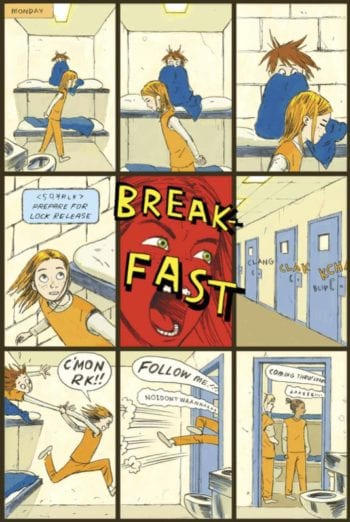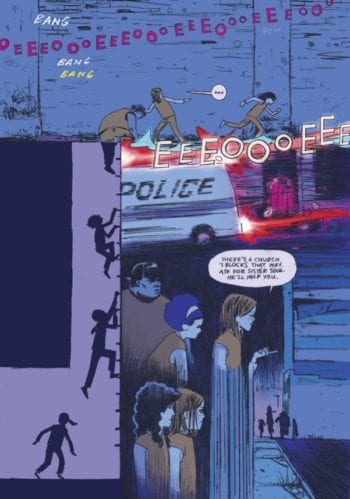Before I started the latest entry in Jim Rugg's Street Angel saga, it flashed on my just how long the book has been around in some form or another. Rare indeed is the still-relevant creator that can lay claim to having been a darling of Wizard magazine; rarer yet is to see a title that was one of the five or six non-mainstream comics those dudes felt comfortable recommending still flourishing. But flourish Street Angel has, for coming up on fifteen years - long enough for the book to elbow its way into a place in the new kind of mainstream that's emerged in response to Act II of Marvel and DC's ongoing commercial and creative collapse. Street Angel lives at Image Comics now, in a series of loosely connected original graphic novels, and the Wednesday racks have changed enough since 2004 that Rugg's brainchild fits right in.
I mention the market upheavals that have positioned Street Angel for greater commercial prominence rather than Rugg's development of his own strip because, quite frankly, Wizard was right. Street Angel has always been ready for the bright lights. Rugg is a skilled and confident draftsman whose imagery hits a sweet spot right in between Bronze Age superhero brawn and Clowes/Hernandez crystal clarity. If anything, this volume of Street Angel, which features flat blocks of computer color over scratchy, uninked pencil drawings, looks more "indie comics" than the Slave Labor Graphics books that kicked off the series' run. Throughout, Rugg shifts seamlessly around the edges of his style, moving from more realistic to more idiomatic cartooning with a precise rhythm imposed by his tightly gridded panel layouts.
 It's always a delight when a talented cartoonist uses drawing kids as an excuse for exploring a cartoonier style, a purer approach to drawing. Here, in a story set in Juvenile Hall, Rugg defines his tweener cast with a delightfully free set of gestures and facial expressions, one that looks like the best possible version of the cartoon faces kids draw in the margins of their classwork when they're bored. Seeing Rugg cut back and forth between polished, elegant drawings of his adult cast members and caricatures of his youthful reprobates is pure pleasure. Leaving the pencils in this comic uninked was definitely the right move; the fuzz of graphite softens the harshness of the flat coloring and allows the immediacy of Rugg's lines to shine through. Even the light scrawls conveying the worn surfaces of walls and floors represent some top flight markmaking.
It's always a delight when a talented cartoonist uses drawing kids as an excuse for exploring a cartoonier style, a purer approach to drawing. Here, in a story set in Juvenile Hall, Rugg defines his tweener cast with a delightfully free set of gestures and facial expressions, one that looks like the best possible version of the cartoon faces kids draw in the margins of their classwork when they're bored. Seeing Rugg cut back and forth between polished, elegant drawings of his adult cast members and caricatures of his youthful reprobates is pure pleasure. Leaving the pencils in this comic uninked was definitely the right move; the fuzz of graphite softens the harshness of the flat coloring and allows the immediacy of Rugg's lines to shine through. Even the light scrawls conveying the worn surfaces of walls and floors represent some top flight markmaking.
The story is typical for a Street Angel comic: light and fizzy, with antic humor and character interaction providing most of the meat (though the colors in the conclusion's escape sequence provide some nice pyrotechnics). Jesse, the titular skateboarding girl ninja, bounces around juvie from cell to mess hall to yard to classes like a self-guided superball, adoration and low-grade chaos following in her wake. But it isn't the wealth of anecdote that forms the book's big weakness. It's the plot. The overarching joke - that life in prison for Jesse is a paradise compared to her usual homelessness - falls flat with an absolutely brutal smack considering the way teen incarceration actually works in this country. At times I felt like I was reading this book through a scuffed and worn pane of glass; Rugg's facility with the comics medium makes it easy to see the verve and humor of what his book presents, but the world outside its covers makes it a difficult task for a lot of the stuff to hit the way it should.
Still, I suppose an issue of a series with as large and venerable a corpus as Street Angel has earned the right to be considered outside of its immediate historical moment to some extent. In a vacuum, this installment resembles nothing more than a particularly solid episode of Recess, another long-running cartoon series that uses ridiculously amped up tropes to illustrate and explore the age-old conflicts of fitting kids still round and peggy with youth into the drearily square holes that society provides for them. The best moments of this book are well-observed and energetic enough to shake off the depressing background knowledge that reading it invites one to contemplate. And who knows? That might be the whole point.
 It's good Rugg has found a home for his girl ninja at Image - I didn't enjoy Street Angel Goes to Juvie as much as last year's After School Kung Fu Special, but it's certainly a good read, and Rugg's prolific output makes it a joy to be able to page through a new one of these a few times a year. In indie action comics, things tend to be stable until they aren't - see Nexus, Hepcats, etc. - but Rugg's quietly miraculous decade-and-a-half journey with Jesse's been a fun ride so far, and those so inclined will find no shortage of enjoyment as long as it lasts.
It's good Rugg has found a home for his girl ninja at Image - I didn't enjoy Street Angel Goes to Juvie as much as last year's After School Kung Fu Special, but it's certainly a good read, and Rugg's prolific output makes it a joy to be able to page through a new one of these a few times a year. In indie action comics, things tend to be stable until they aren't - see Nexus, Hepcats, etc. - but Rugg's quietly miraculous decade-and-a-half journey with Jesse's been a fun ride so far, and those so inclined will find no shortage of enjoyment as long as it lasts.







